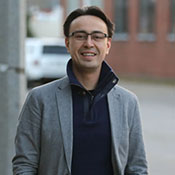
Pianist Orli Shaham: Making musical connections for all ages
David Lewellen
PUBLISHED
Tagged Under: 2018.19 Season, Guest Artist, Musician, piano
About nine years ago, pianist Orli Shaham was soloing with the San Antonio Symphony, conducted by Ken-David Masur, who was recently named the Milwaukee Symphony’s next music director. Soloist and conductor had a free afternoon, and they both took their toddlers to the local children’s museum. “Our kids bonded in the ball pit,” Shaham remembers, “and we spent a lot of time talking about how to connect children to music.”
This week, Shaham comes to Milwaukee (without Masur) to play Bartok’s Piano Concerto No. 3, but her thoughts about children and music have continued to develop. “I’m a terrible singer. I have no voice,” she said, “but when my kids were born, it felt natural to sing to them. It felt so right and so good.”
Now that her twin sons are 11 and studying instruments, Shaham faces the classic parental dilemma of how to encourage without being pushy. “They’re not going to practice on their own,” she said. “But as soon as you can, step away from the moving kid. I think I was 14 when I understood how to practice on my own, how to work on something without being told and how to use my time efficiently.”
At that age, she was often practicing at the same time as her brother, violinist Gil Shaham. “We would go into each other’s rooms and sight-read things,” she said, “or we would each play one hand of a difficult two-hand piece.” When they collaborate now as adults, “there’s a depth to our musical understanding of each other,” she said. “We can communicate with just a glance. That’s unique to someone with whom you learned this language in the first place.”
As a soloist, Shaham tries to make a point of mixing up her repertoire; the variety is good for her musically, and she sees how everything influences everything else. Playing Brahms and Bartok in the same season, for instance, she is struck by the way that Brahms, a German, used Hungarian music. Bartok was a native Hungarian born about 50 years later, but as a composer, “it was impossible for him not to hear [his country’s music] through the ears of Brahms.”
Performing a world premiere of a concerto by Steven Mackey a few years ago, and working with him to shape the end result, “really changed the way I think about composers in the canon,” Shaham said. “It becomes palpable how human they are.” The concerto that she will perform in Milwaukee, for example, was written by Bartók for his wife while he was dying, with the idea that she could earn income from performing it. It’s very different from his first two, which he wrote for himself, Shaham said.
The first movement she describes as “like telling a folk tale. It’s spare orchestration, with rich colors but very clean lines. I’m struck by how Mozartean it is in its collaboration with the orchestra.” Continuing in the prayer-like second movement and the rollicking third movement, “it’s all used precisely to the effect he wants to, and no more.”
Shaham is also the founder of Baby Got Bach, a concert format for children ages 3 to 7 – which she started when her own sons had “aged out of Mommy and Me but weren’t ready for school age.” Her schedule does not allow her to do more than a few a year, but she hopes to package the format so that others can follow it. Children fully participate in the concert, and she prefers a small enough venue that she can meet most of the audience. “It shows the kids that music exists and they can be part of making it,” she said.


